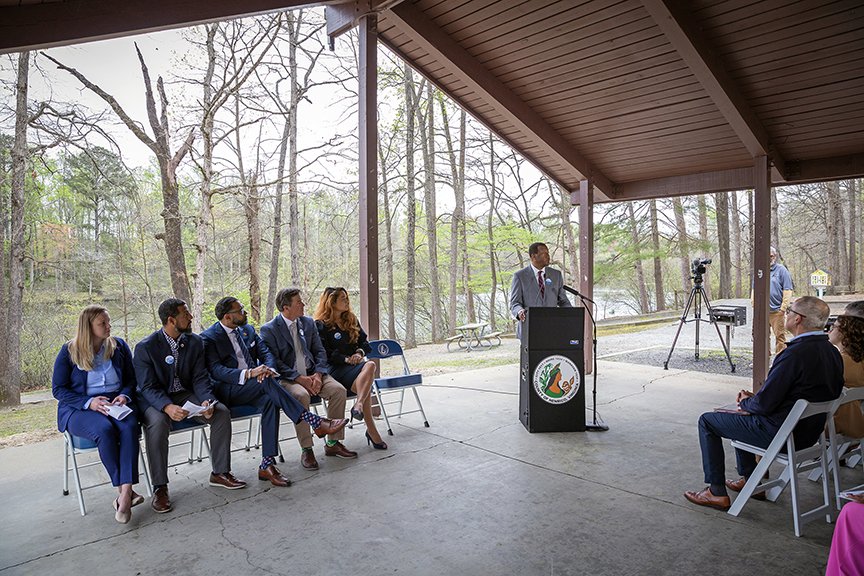
Financing Resilience
For Property Owners: The National Flood Insurance Program
The National Flood Insurance Program (NFIP) is a federal program designed to help property owners in flood-prone areas protect themselves from financial loss due to flooding. In Virginia, where rising sea levels and increasingly intense storms pose a significant threat, the NFIP offers critical support by providing affordable flood insurance to homeowners, renters, and businesses. Flood insurance through the NFIP not only covers the costs of rebuilding and recovery after a flood, but also enables residents to meet local resilience requirements, which can help lower annual insurance premiums.
Be sure to check out our Understanding Flood Insurance master page for more details.
For Landowners, Local Governments, Nonprofit Organizations, and Community Groups: Coastal Resilience & Trees Fund
The Coastal Resilience & Trees Fund provides grants to localities, organizations, and landowners for wetland restoration and conservation projects in Virginia’s Coastal Zone. Administered in partnership with the Virginia Outdoors Foundation, this program is designed to enhance coastal resilience and increase the tree canopy by providing funds to local initiatives.
For Localities
The Community Flood Preparedness Fund
The Community Flood Preparedness Fund (CFPF) is a key component of Virginia's strategy to combat climate change impacts, offering financial support for local and regional flood risk management and climate adaptation projects. Administered by the Virginia Department of Conservation and Recreation (DCR), the fund supports activities such as flood mitigation planning, infrastructure improvements, and retrofitting structures to withstand future flooding. The CFPF prioritizes nature-based solutions like wetland restoration and living shorelines, while also focusing on environmental justice by ensuring that socially vulnerable and underserved communities receive critical flood protection. Through this comprehensive approach, the CFPF promotes both equity and sustainability in building long-term resilience across the Commonwealth.
Visit our Community Flood Preparedness Fund (CFPF) page for details.
Wetlands Watch’s Online Grants Database
Wetlands Watch created an Online Grants Database that includes a wide array of grant opportunities for projects related to climate resilience, habitat restoration, water quality improvements, and more. At present, the Database includes more than twenty tailor-made fact sheets that include sortable characteristics like matching requirements, eligibility requirements, due dates, minimum and maximum funding levels, and so on.
Other Resources
The Virginia Coastal Resilience Master Plan’s Funding Opportunities database was created using a Wetlands Watch funding database developed in 2018 (begins on page 17).
The Campbell Foundation’s “An Overview of Recent Federal Funding & Opportunities for the Chesapeake Region”
Columbia Law School’s Sabine Center for Climate Change Law and Environmental Defense Fund IRA grant tracker.
Department of the Interior BIL interactive map shows approved projects to date.
The Resilient Virginia Revolving Fund
The Resilient Virginia Revolving Fund (RVRF) is a state-managed financial funding tool designed to provide low-interest loans and financing to local governments, planning districts, and other eligible entities for climate resilience projects. Established under the Clean Energy and Community Flood Preparedness Act of 2020, the RVRF supports initiatives aimed at mitigating the impacts of flooding, sea level rise, and other climate-related risks.
Eligible projects include flood control infrastructure, stormwater management, shoreline restoration, and other adaptive measures that enhance community resilience. By offering revolving loans, the RVRF enables long-term investment in resilience strategies, particularly for vulnerable communities that may lack the upfront capital for large-scale projects, while fostering sustainable climate adaptation throughout Virginia.
See our Resilient Virginia Revolving Fund (RVRF) page for more details.
Decisions, Decisions
Which state fund is appropriate to your project? Check out our cheat sheet below.
A Note on Federal Grants
At Wetlands Watch, we know a thing or two about grant funding. Grant funding keeps our lights on, our staff paid, and our project work proceeding as designed. We experience annual seasons of intense grant writing and reporting, with periods of respite spent actually doing the work we committed to do.
Grant-prospecting can be a real burden on an organization that at the end of the day just wants to get back to pursuing the mission. We’d like to share some of the resources that have been helpful to Wetlands Watch, and many others, and invite you to consult our own federal grants database.
One important note. When planning your projects, please prioritize work that helps those communities with the greatest need. All federal grant programs must now comply with the Justice40 initiative. The Justice40 Initiative, established by an executive order under the Biden administration, mandates that 40% of the overall benefits of certain federal investments, including those in climate and clean energy, must flow to disadvantaged communities that are marginalized, underserved, and overburdened by pollution and environmental hazards.
If you don’t have experience working in a disadvantaged community or engaging in equity-driven projects, please reach out to us—we’re happy to share our approach and connect you with our partners doing this important work.

